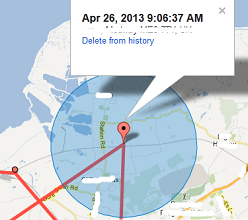That's most likely not a GPS position, but rather a WiFi hotspot. Google's location service makes use of different identifiers:
- GPS
- WiFi hotspots
- Cell towers
While GPS should be quite accurate (bad conditions might give lower accuracy, but usually shouldn't place you too far off), and cell towers usually are not moving -- WiFi hotspots may exactly do that. I will give you an example situation to understand:
Say, Google's "StreetView cars" passed my house/flat in NYC 2 years ago, while my homy WiFi hotspot was turned on. So they recorded my hotspot's SSID, and connected it with the current GPS location. 6 month later, someone passing by my NYC home with "network location" turned on, gets a fine (and relatively accurate) position from that: location service asked Google's database about my hotspot's SSID, and got the coordinates back.
Fine, so far -- but a year ago I decided to move to San Diego. I completed that 6 month ago, and set up my WiFi hotspot again. Now you pass by my house, your device detects my SSID, asks Google for that hotspot's location... and suddenly you are in NYC, as Google did not update its database yet!
That's how it mostly happens -- and that's how I traveled hundreds of miles in a few seconds a couple of times (my ears still ringing from that acceleration, as I also traveled back a few seconds later)...
To prove you're unlikely having been there, check your other stored locations and check their timestamps. Try to find some with a timestamp close to the wrong location. Once it turned out you must have traveled light-speed to make those data becoming true, the error should become obvious.

